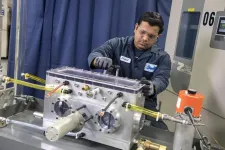(Press-News.org) More than 47,000 people died in Europe as a result of high temperatures in 2023, the warmest year on record globally and the second warmest in Europe. This is the estimate of a study led by the Barcelona Institute for Global Health (ISGlobal), a centre supported by the "la Caixa" Foundation, and published in Nature Medicine. The researchers report that the vulnerability to heat of European societies has progressively decreased over the present century, and estimate that without these societal adaptation processes, the heat related mortality burden over the past year would have been 80% higher.
The study replicates the methodology used last year in another paper published in Nature Medicine, which estimated that heat caused more than 60,000 deaths during the summer of 2022, which represented the highest heat related mortality burden of the last decade. In a nutshell, researchers used temperature and mortality records from 823 regions in 35 European countries for the period 2015-2019 to fit epidemiological models to estimate heat related mortality in each European region over the entire year 2023.
In contrast to the summer of 2022, which was characterised by persistent extreme temperatures in the central part of the season from mid-July to mid-August, no large thermal anomalies were recorded during the same weeks in 2023. However, two episodes of high temperatures in mid-July and late August would have accounted for more than 57% of the overall estimated mortality, with more than 27,000 deaths.
Southern European countries, the most affected
The results show a total of 47,690 estimated deaths in 2023 across the 35 countries as a whole, of which 47,312 deaths would have occurred in the hottest period of the year (between 29 May and 1 October). When accounting for the population, the countries with the highest heat related mortality rates were in southern Europe, namely Greece (393 deaths per million), Bulgaria (229 deaths per million), Italy (209 deaths per million), Spain (175 deaths per million), Cyprus (167 deaths per million) and Portugal (136 deaths per million).
Table 1. The 10 European countries with the highest mortality rate (deaths per million) attributable to heat in 2023.
Country
Overall
Women
Men
Greece
393
486
239
Bulgaria
229
241
204
Italy
209
267
150
Spain
175
212
135
Cyprus
167
176
159
Portugal
136
143
104
Malta
134
157
146
Croatia
132
161
82
Romania
128
116
141
Albania
120
129
57
Europe
88
113
73
Table 2. Top 10 European countries with the highest number of heat-attributable deaths in 2023.
Country
Overall
Women
Men
Italy
12,743
8,388
4,436
Spain
8,352
5,180
204
Germany
6,376
3,119
150
Greece
4,339
2,749
135
France
2,734
1,334
159
Romania
2,585
1,192
104
United Kingdom
1,851
Not Available
Not Available
Bulgaria
1,670
899
724
Portugal
1,432
794
519
Poland
616
457
212
Europe
47,690
27,627
17,117
The following link shows the details of the mortality estimates for the 35 countries analysed.
Higher vulnerability for women and people over 80 years
In line with previous studies, the data show a higher vulnerability of women and older people. Specifically, after accounting for the population, the heat related mortality rate was 55% higher in women than in men, and 768% higher in people over 80 years of age than in people aged between 65 and 79 years.
Possible underestimation of the actual heat related mortality burden
The authors of the study caution that these numbers may underestimate the actual heat related mortality burden. Due to the unavailability of daily, homogeneous mortality records during the year of 2023, they had to use weekly counts of deaths from Eurostat. In a recent study published in the Lancet Regional Health – Europe, the same authors showed that the use of weekly data would lead to an underestimation of the heat related mortality burden, and described a methodology to correct this bias. Taking this into account, researchers estimate that the likely heat related death toll in 2023 could have actually been of the order of 58,000 deaths in the 35 countries studied, although a more accurate estimate could only be obtained if improved mortality databases were made available to the scientific community.
Societal adaptation to heat prevents up to 80% of mortality
One of the aims of the study was to assess whether there has been a decrease of the vulnerability to heat in Europe, a process that is generally understood as an adaptation to rising temperatures. To do this, the researchers fitted the same type of model to temperature and mortality data from the periods 2000-2004, 2005-2009, 2010-2014 and 2015-2019. They then plugged 2023 temperatures and mortality numbers into each of the four models to estimate the number of deaths that would have occurred in each period if temperatures had been as high as they had been in 2023.
Using this method, it was estimated that if the temperatures recorded in 2023 had occurred in the period 2000-2004, the estimated heat related mortality would have exceeded the number of 85,000 deaths, that is, 80% higher than the result arising from the vulnerability to heat in the period 2015-2019. For people over 80 years, the number of deaths would have more than doubled, from 1,102 to more than 2,200 heat related deaths.
"Our results show how there have been societal adaptation processes to high temperatures during the present century, which have dramatically reduced the heat-related vulnerability and mortality burden of recent summers, especially among the elderly”, says Elisa Gallo, researcher at ISGlobal and first author of the study.
"For example, we see that since 2000, the minimum mortality temperature - the optimum temperature with the lowest mortality risk - has been gradually warming on average over the continent, from 15ºC in 2000-2004 to 17.7ºC in 2015-2019. This indicates that we are less vulnerable to heat than we were at the beginning of the century, probably as a result of general socio-economic progress, improvements in individual behaviour and public health measures such as the heat prevention plans implemented after the record-breaking summer of 2003", adds Elisa Gallo.
Beyond physiological limits of adaptation
“In 2023, almost half of the days exceeded the 1.5°C threshold set by the Paris Agreement and Europe is warming at a rate twice as fast as the global average. Climate projections indicate that the 1.5°C limit is likely to be exceeded before 2027, leaving us a very small window of opportunity to act”, says Joan Ballester Claramunt, Principal Investigator of the European Research Council (ERC) Consolidator Grant EARLY-ADAPT (https://www.early-adapt.eu/).
“We need to take into account that inherent limits in human physiology and societal structure are likely to set a bound to the potential for further adaptation in the future. There is an urgent need to implement strategies aimed at further reducing the mortality burden of the coming warmer summers, together with more comprehensive monitoring of the impacts of climate change on vulnerable populations. These adaptation measures must be combined with mitigation efforts by governments and the general population to avoid reaching tipping points and critical thresholds in temperature projections”, he adds.
Forecaster.health, a tool for predicting mortality risk by sex and age
Recently, the research group that carried out the study presented Forecaster.health, a web-based tool open to the public that provides predictions of mortality risk associated with cold and heat by gender and age for 580 regions in 31 European countries. This early warning system is not based solely on meteorological data, but incorporates epidemiological models to estimate the actual health risks for each population group. Forecaster.health is available free of charge (https://forecaster.health/) and provides forecasts up to 15 days in advance.
EARLY-ADAPT project
The study has been carried out in the context of the EARLY-ADAPT project (https://www.early-adapt.eu/), funded by the European Research Council, and aimed at studying how populations are adapting to the public health challenges triggered by climate change.
Reference
Elisa Gallo, Marcos Quijal-Zamorano, Raúl Fernando Méndez Turrubiates, Cathryn Tonne, Xavier Basagaña, Hicham Achebak & Joan Ballester. Heat-related mortality in Europe during 2023 and the role of adaptation in protecting health. Nature Medicine, 2024. https://doi.org/10.1038/s41591-024-03186-1
END
Heat caused over 47,000 deaths in Europe in 2023, the second highest burden of the last decade
Heat related mortality would have been 80% higher in absence of the adaptation observed during the present century
2024-08-12
ELSE PRESS RELEASES FROM THIS DATE:
Early-childhood tablet use and outbursts of anger
2024-08-12
About The Study: Child tablet use at age 3.5 years was associated with more expressions of anger and frustration by the age of 4.5 years in this study. Child proneness to anger/frustration at age 4.5 years was then associated with more use of tablets by age 5.5 years. These results suggest that early-childhood tablet use may contribute to a cycle that is deleterious for emotional regulation.
Corresponding Author: To contact the corresponding author, Caroline Fitzpatrick, PhD, email caroline.fitzpatrick@usherbrooke.ca.
To access the embargoed ...
Alcohol consumption patterns and mortality among older adults with health-related or socioeconomic risk factors
2024-08-12
About The Study: In this cohort study of older drinkers from the UK, even low-risk drinking was associated with higher mortality among older adults with health-related or socioeconomic risk factors. The attenuation of mortality observed for wine preference and drinking only during meals requires further investigation, as it may mostly reflect the effect of healthier lifestyles, slower alcohol absorption, or nonalcoholic components of beverages.
Corresponding Author: To contact the corresponding author, Rosario Ortolá, MD, PhD, ...
An appetizer can stimulate immune cells’ appetite, a boon for cancer treatments
2024-08-12
(Santa Barbara, Calif.) — The body has a veritable army constantly on guard to keep us safe from microscopic threats from infections to cancer. Chief among this force is the macrophage, a white blood cell that surveils tissues and consumes pathogens, debris, dead cells, and cancer. Macrophages have a delicate task. It’s crucial that they ignore healthy cells while on patrol, otherwise they could trigger an autoimmune response while performing their duties.
Researchers at UC Santa Barbara sought to understand how these immune cells choose what and when to eat. A paper published ...
New genetically engineered wood can store carbon and reduce emissions
2024-08-12
Researchers at the University of Maryland genetically modified poplar trees to produce high-performance, structural wood without the use of chemicals or energy intensive processing. Made from traditional wood, Engineered wood is often seen as a renewable replacement for traditional building materials like steel, cement, glass and plastic. It also has the potential to store carbon for a longer time than traditional wood because it can resist deterioration, making it useful in efforts to reduce carbon emissions.
But the hurdle to true sustainability in engineered wood is that it requires processing with volatile chemicals and a significant amount of energy, and ...
NK cells expressing interleukin-21 show promising antitumor activity in glioblastoma cells
2024-08-12
Natural killer (NK) cells engineered to express interleukin-21 (IL-21) demonstrated sustained antitumor activity against glioblastoma stem cell-like cells (GSCs) both in vitro and in vivo, according to new research from The University of Texas MD Anderson Cancer Center.
The preclinical findings, published today in Cancer Cell, represent the first evidence that engineering NK cells, a type of innate immune cell, to secrete IL-21 resulted in strong activity against glioblastoma, a cancer type in need of more effective treatment options.
“Our ...
Strong insurance laws help kids get access to mental health care
2024-08-12
When states require insurers to cover mental and behavioral health, children get better access to care, according to a UC San Francisco-led study of nearly 30,000 U.S. caregivers.
They found that 1 in 8 caregivers had difficulty accessing mental health services for their children between 2016 and 2019. But those who lived in states with the most comprehensive mental and behavioral health coverage laws were about 20% less likely to report trouble accessing care than those who lived in states with the least comprehensive laws.
Caregivers of Black and Asian children were more likely to report poor access to mental and ...
State-of-the-art brain recordings reveal how neurons resonate
2024-08-12
For decades, scientists have focused on how the brain processes information in a hierarchical manner, with different brain areas specialized for different tasks. However, how these areas communicate and integrate information to form a coherent whole has remained a mystery. Now, researchers at University of California San Diego School of Medicine have brought us closer to solving it by observing how neurons synchronize across the human brain while reading. The findings are published in Nature Human Behavior and are also the basis of a thesis by UC San Diego School of Medicine doctoral candidate Jacob Garrett.
“How the activity of the brain relates to the subjective ...
New study reveals unique histone tag in adult oligodendrocyte progenitor cells, opening doors for advanced myelin repair therapies
2024-08-12
NEW YORK, August 12, 2024 — In a groundbreaking study, researchers with the Advanced Science Research Center at the CUNY Graduate Center (CUNY ASRC) have identified a distinct histone tag in adult oligodendrocyte progenitor cells (OPCs) that may pave the way for innovative therapies targeting myelin repair, a critical target for several neurodegenerative and psychiatric disorders, including multiple sclerosis, Alzheimer’s disease, and schizophrenia. The histone tag, characterized by lysine 8 acetylation on histone H4, identifies a significant departure from the histone modifications found in neonatal OPCs.
Detailed in a ...
SwRI launches Electrified Vehicle and Energy Storage Evaluation-II battery consortium
2024-08-12
SAN ANTONIO — August 12, 2024 – Southwest Research Institute (SwRI) is launching the next phase of an electric vehicle (EV) battery consortium dedicated to understanding performance of energy storage systems. The Electrified Vehicle and Energy Storage Evaluation-II (EVESE-II) consortium builds on more than a decade of SwRI-led, precompetitive research with companies across the mobility sector.
“We are proud to serve the EV industry by bringing together manufacturers, suppliers and battery designers and developers with materials scientists to address a variety of challenges,” said Dr. Andre Swarts, an SwRI staff engineer ...
Possible explanation for link between diabetes and Alzheimer's
2024-08-12
People with type 2 diabetes are at increased risk of Alzheimer's disease and other cognitive problems. A new study led by Umeå University, Sweden, shows that the reason may be that people with type 2 diabetes have more difficulty getting rid of a protein that may cause the disease.
"The results may be important for further research into possible treatments to counteract the risk of people with type 2 diabetes being affected by Alzheimer's," says Olov Rolandsson, senior professor at the Department of Public Health and Clinical Medicine at Umeå University, research leader and first author of the study.
The substances ...
LAST 30 PRESS RELEASES:
Roadmap for Europe’s biodiversity monitoring system
Novel camel antimicrobial peptides show promise against drug-resistant bacteria
Scientists discover why we know when to stop scratching an itch
A hidden reason inner ear cells die – and what it means for preventing hearing loss
Researchers discover how tuberculosis bacteria use a “stealth” mechanism to evade the immune system
New microscopy technique lets scientists see cells in unprecedented detail and color
Sometimes less is more: Scientists rethink how to pack medicine into tiny delivery capsules
Scientists build low-cost microscope to study living cells in zero gravity
The Biophysical Journal names Denis V. Titov the 2025 Paper of the Year-Early Career Investigator awardee
Scientists show how your body senses cold—and why menthol feels cool
Scientists deliver new molecule for getting DNA into cells
Study reveals insights about brain regions linked to OCD, informing potential treatments
Does ocean saltiness influence El Niño?
2026 Young Investigators: ONR celebrates new talent tackling warfighter challenges
Genetics help explain who gets the ‘telltale tingle’ from music, art and literature
Many Americans misunderstand medical aid in dying laws
Researchers publish landmark infectious disease study in ‘Science’
New NSF award supports innovative role-playing game approach to strengthening research security in academia
Kumar named to ACMA Emerging Leaders Program for 2026
AI language models could transform aquatic environmental risk assessment
New isotope tools reveal hidden pathways reshaping the global nitrogen cycle
Study reveals how antibiotic structure controls removal from water using biochar
Why chronic pain lasts longer in women: Immune cells offer clues
Toxic exposure creates epigenetic disease risk over 20 generations
More time spent on social media linked to steroid use intentions among boys and men
New study suggests a “kick it while it’s down” approach to cancer treatment could improve cure rates
Milken Institute, Ann Theodore Foundation launch new grant to support clinical trial for potential sarcoidosis treatment
New strategies boost effectiveness of CAR-NK therapy against cancer
Study: Adolescent cannabis use linked to doubling risk of psychotic and bipolar disorders
Invisible harms: drug-related deaths spike after hurricanes and tropical storms
[Press-News.org] Heat caused over 47,000 deaths in Europe in 2023, the second highest burden of the last decadeHeat related mortality would have been 80% higher in absence of the adaptation observed during the present century



